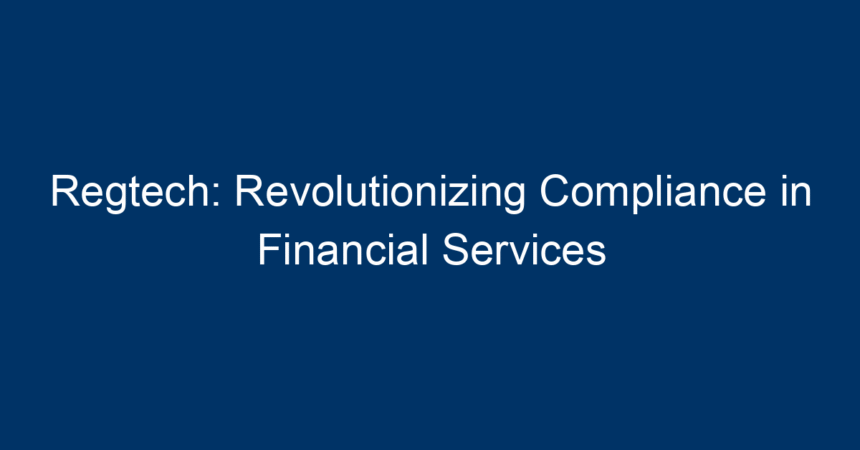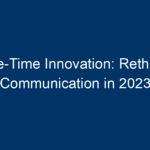In the rapidly evolving landscape of financial services, compliance remains a cornerstone that institutions must navigate meticulously. As regulations become increasingly complex and varied, financial organizations are turning to innovation for answers. Enter regtech—a transformative force that is not only streamlining compliance processes but also redefining how organizations manage regulatory challenges. This article explores the phenomenon of regtech, its implications for the financial services sector, and how businesses can leverage this technology to enhance compliance efforts.
Understanding Regtech
What is Regtech?
Regtech, short for regulatory technology, refers to the use of technology, particularly software, to help companies comply with regulations efficiently and effectively. Emerging from the financial crisis of 2008, regtech solutions have been designed to address the increasing volume of regulations and the intricacies of compliance management. By automating and optimizing compliance processes, regtech platforms provide organizations with innovative tools to meet their regulatory obligations.
The Components of Regtech
Regtech encompasses several technological dimensions, including:
- Data Analytics: Advanced analytics tools analyze vast data sets in real-time, helping firms identify compliance risks and areas for improvement.
- Artificial Intelligence (AI): AI algorithms enhance monitoring and reporting by recognizing patterns and anomalies that may indicate compliance issues.
- Blockchain Technology: This decentralized technology offers secure, transparent record-keeping that can simplify compliance verification.
- Machine Learning: Regtech solutions use machine learning to adapt to new regulatory requirements dynamically, minimizing the need for manual oversight.
The Need for Regtech in Financial Services
Increasing Regulatory Demands
The financial sector is subject to a plethora of regulations, from anti-money laundering (AML) requirements to data protection laws like GDPR. Compliance with these regulations is not merely best practice; failing to adhere can result in substantial fines and reputational damage. As the regulatory landscape continues to evolve, traditional compliance methods often fall short, highlighting the need for more agile and efficient solutions.
The Cost of Non-Compliance
Non-compliance can be costly—not just financially, but also in terms of reputation and customer trust. Institutions that fail to meet regulatory standards face severe penalties, including fines, legal fees, and a loss of business. Regtech can mitigate these risks by providing organizations with tools to enhance oversight and compliance tracking, reducing the chances of violations.
How Regtech is Transforming Compliance
Automation of Compliance Processes
One of the most significant advantages of regtech is its ability to automate time-consuming compliance tasks. Organizations can streamline reporting, monitoring, and data management processes using regtech solutions. Automation not only increases efficiency but also allows compliance teams to focus on strategic initiatives rather than mundane tasks.
Real-Time Monitoring and Reporting
With many regtech tools offering real-time monitoring capabilities, financial institutions can instantly detect compliance breaches or deviations from regulations. This proactive approach allows organizations to address issues as they arise, minimizing the potential for severe penalties.
Enhanced Risk Management
Effective risk management is at the heart of compliance. Regtech solutions utilize cutting-edge analytics to identify trends and anomalies, facilitating a more robust risk assessment process. By anticipating potential compliance issues, organizations can take corrective actions before they escalate.
Scalability
As businesses grow, so do their compliance obligations. Regtechs are designed to scale alongside organizations, accommodating new lines of business and geographic expansion without requiring a complete overhaul of existing compliance systems. This scalability is vital for companies looking to innovate while maintaining rigorous compliance standards.
Key Benefits of Implementing Regtech
Cost-Effectiveness
Investing in regtech can lead to substantial cost savings over time. By automating routine tasks and enhancing efficiency, organizations can cut down on compliance-related labor costs and avoid hefty fines associated with non-compliance.
Improved Accuracy
Human error is a significant risk in compliance processes. Regtech minimizes this risk by utilizing advanced algorithms and machine learning to ensure data accuracy and reduce the likelihood of regulatory breaches due to mistakes.
Faster Innovation Cycles
The ability to adapt to changing regulations swiftly is crucial in today’s financial landscape. Regtech solutions facilitate quicker compliance updates, allowing firms to innovate and launch new products without fear of regulatory backlash.
Challenges Facing Regtech Adoption
Integration with Existing Systems
One of the primary challenges institutions face when adopting regtech solutions is integrating them with existing legacy systems. Ensuring compatibility can require careful planning and additional resources.
Data Privacy Concerns
As regtech relies on data collection and analysis, concerns around data privacy and security often arise. Institutions must implement robust data governance frameworks to protect sensitive customer information while complying with regulations.
Keeping Pace with Regulatory Changes
The regulatory environment is always evolving. Regtech solutions must continuously adapt to ensure compliance with new legislation, which can be a daunting task for providers and users alike.
Future of Regtech in Financial Services
Ongoing Innovation
As technology continues to evolve, so too will regtech solutions. Innovations in AI, machine learning, and data analytics will likely enhance the effectiveness of these tools, providing organizations with even greater capabilities to address compliance challenges.
Collaboration Across Sectors
The future of regtech may also involve increased collaboration across various sectors. Regulatory bodies, financial institutions, and technology providers can work together to create frameworks and standards that enhance compliance processes industry-wide.
Global Expansion
Regtech adoption is not confined to any one market. As financial institutions across the globe recognize the value of these technologies, we can expect to see regtech solutions gaining traction in developing markets as well, driving global consistency in compliance standards.
Actionable Insights for Financial Institutions
-
Evaluate Current Compliance Processes:
Conduct a comprehensive review of your existing compliance practices to identify areas that can benefit from regtech solutions. -
Explore Regtech Providers:
Research various regtech providers to find solutions that align with your organization’s specific regulatory needs and existing infrastructure. -
Prioritize Data Security:
Implement strong data governance policies to ensure that the adoption of regtech does not compromise customer information or violate data privacy regulations. -
Invest in Training:
Equip your compliance teams with the necessary training to understand and utilize new regtech tools effectively. This investment can save time and resources in the long run. - Stay Informed:
Keep abreast of regulatory changes and emerging trends in regtech. Engaging with industry partners and attending relevant conferences can provide valuable insights.
Conclusion
In conclusion, regtech represents a seismic shift in how financial institutions approach compliance. By harnessing the power of technology, organizations can enhance their compliance frameworks, improve efficiency, and adapt to the ever-changing regulatory landscape. As regtech continues to evolve, those who proactively embrace these innovations will likely gain a competitive edge, ultimately fostering a culture of compliance that protects their reputation and their customers. The future of financial services is here, and with it, a more streamlined, efficient, and compliant path forward.




